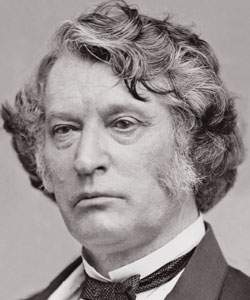Charles Sumner, Free Soil Party (American National Biography)
Scholarship
By 1848 the United States had seized vast new western territories from Mexico, leading Sumner and his faction to join with the Liberty party and northern antislavery Democrats to create the new Free Soil party. In so doing Sumner never hesitated in attacking former friends, whom he said supported the slave power in an alliance between "the lords of the lash and the lords of the loom." Such attacks were fast becoming a Sumner trademark, as he spared no one who opposed his goals. The young reformer did not confine his concern for racial justice to territorial slavery. In 1849 he argued in court for the integration of Boston's public schools and, while losing his case, presented arguments for social change far in advance of his times.
Participation in the Free Soil movement gave Sumner his first taste of political prominence, which he quickly utilized to secure public office. In a skillful political maneuver in 1851, Massachusetts Free Soilers formed a coalition in the state legislature with Democrats and secured Sumner's election to the U.S. Senate. Thus began his long tenure as an outspoken reformer in Congress.
Participation in the Free Soil movement gave Sumner his first taste of political prominence, which he quickly utilized to secure public office. In a skillful political maneuver in 1851, Massachusetts Free Soilers formed a coalition in the state legislature with Democrats and secured Sumner's election to the U.S. Senate. Thus began his long tenure as an outspoken reformer in Congress.
Frederick J. Blue, "Sumner, Charles," American National Biography Online, February 2000, http://www.anb.org/articles/04/04-00969.html.
Charles Sumner, Civil War & Slavery (American National Biography)
Scholarship
For Sumner the Civil War presented the opportunity to free the slaves, and he became one of the first members of Congress to urge abolition. He worked for the next eighteen months to persuade President Abraham Lincoln. During that time he skillfully pushed legislation that weakened slavery in numerous small ways, as he successfully prepared public opinion to accept black freedom. Clearly he was among the most important of those who influenced Lincoln to issue his Emancipation Proclamation. So, too, he helped convince Lincoln of the wisdom and justice of allowing blacks to join Union armies against the Confederacy in behalf of their own freedom.
Frederick J. Blue, "Sumner, Charles," American National Biography Online, February 2000, http://www.anb.org/articles/04/04-00969.html.
Charles Sumner (Congressional Biographical Directory)
Reference
SUMNER, Charles, a Senator from Massachusetts; born in Boston, Mass., January 6, 1811; attended the Boston Latin School; graduated from Harvard University in 1830 and from the Harvard Law School in 1833; admitted to the bar the following year and commenced the practice of law in Boston, Mass.; lectured at the Harvard Law School 1836-1837; traveled extensively in Europe 1837-1840; declined the Whig nomination in 1846 for election to the Thirtieth Congress; one of the founders of the Free Soil Party in 1848; unsuccessful candidate for election in 1848 on the Free Soil ticket to the Thirty-first Congress; elected to the United States Senate in 1851 as a Free Soiler; reelected as a Republican in 1857, 1863, and 1869 and served from April 24, 1851, until his death; in response to his “Crime Against Kansas” speech, was assaulted by Representative Preston Brooks of South Carolina on May 22, 1856, while in his seat in the Senate, and was absent on account of injuries received until December 1859; chairman, Committee on Foreign Relations (Thirty-seventh through Forty-first Congresses), Committee on Privileges and Elections (Forty-second Congress); removed as chairman of the Committee on Foreign Relations in 1871 as a result of differences with President Ulysses S. Grant over policy in Santo Domingo; died in Washington, D.C., March 11, 1874; lay in state in the Rotunda of the U.S. Capitol, March 13, 1874; interment in Mount Auburn Cemetery, Cambridge, Mass.
“Sumner, Charles,” Biographical Directory of the United States Congress, 1774 to Present, http://bioguide.congress.gov/scripts/biodisplay.pl?index=S001068.
Caning of Sumner (Boyer, 2008)
Textbook
On the day before the sack of Lawrence, Republican senator Charles Sumner of Massachusetts delivered a bombastic and wrathful speech, "The Crime Against Kansas," in which he verbally whipped most of the U.S. Senate for complicity in slavery. Sumner singled out Senator Andrew Butler of South Carolina…Two days later, a relative of Butler, Democratic representative Preston Brooks of South Carolina, strode into the Senate chamber, found Sumner at his desk, and struck him repeatedly with a cane. The hollow can broke after five or six blows, but Sumner required stitches, experienced shock, and did not return to the Senate for three years. Brooks became an instant hero in the South, and the fragments of his weapon were "begged as sacred relics." A new cane, presented to Brooks by the city of Charleston, bore the inscription "Hit him again."
Paul S. Boyer, et al., eds., The Enduring Vision: A History of the American People, 6th ed. (Boston: Houghton Mifflin Company, 2008), 409.






